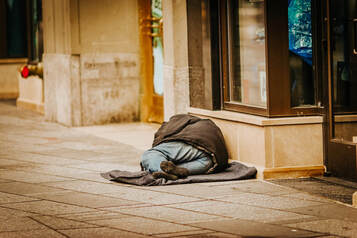
As an immigration advisor on the Rough Sleepers team at RAMFEL, I represent migrants from many different backgrounds and histories who have found themselves rough sleeping due to a lack of immigration status. These are people who are highly vulnerable, as without immigration status, they have no right to work, no right to rent and no safety net to fall back on.
We work on a mix of immigration cases in order to help migrants get back on their feet. Some of the most difficult are applications for permission to stay for migrants who have lived in the UK for over 20 years – with or without immigration status. In order to be granted permission to stay on this route, the government asks for at least one piece of evidence for every year the person has been living in the UK. While that may seem fairly straight-forward for the general population, who are likely to have work records, bank statements and utility bills for instance, this can be extremely difficult for those who have been homeless and living under the radar for many years. Homelessness causes people to move around often, meaning people struggle to keep their belongings and crucial documents with them. Belongings and ID documents are often stolen from people bedded up on the street when they are sleeping. On top of this, those without immigration status often don’t have any records as they have either not accessed services in a deliberate attempt to avoid detection by the authorities – understandably fearful of detention or deportation – or because the government’s “hostile environment” bars them from accessing many basic services. People have told me that they walk around London throughout the night, or sleep on moving buses and trains, in order to stay warm but also to avoid being noticed. This makes it much harder to trace any records of the person living in the UK. It is very common for people who are making these kind of applications to have severe mental and physical health problems brought on by years of homelessness and destitution. I have seen how rough sleeping puts a huge strain on mental and physical health. I have had clients who have spent so long rough sleeping that they have completely lost their memory to the point where they can hardly recall their past at all. Several others have suffered from strokes, which has affected their ability to understand their situation and recall their past, as well as causing physical difficulties. It is virtually impossible to obtain records for people when they cannot remember where they were, what they were doing and even who their partners and family are. Despite these difficulties we have recently had a number of successes at RAMFEL. For instance, I had a client whose case I was worried about, as I could hardly find any evidence at all of his life in the UK. He had been living between people’s homes and on the street, rarely asking for help, so records were non-existent. However, fortunately, I found out that despite never attending any hospital or GP in the UK, he had miraculously been attending a dentist every year since he arrived, so we used these records to make his application. He was recently granted permission to stay. At RAMFEL, we have also been urging the government to consider cases where people are homeless, and have been living in the UK for almost 20 years. This 20-year mark is arbitrary, and there is very little point in making people wait longer to apply when they are destitute, homeless and highly vulnerable and are eventually, without question, going to be granted leave to remain. As a result of years of homelessness, many of our clients have care needs and are provided with accommodation and financial support by their local authority. It is illogical to require local authorities to continue paying out for people with care needs, putting pressure on their limited finances, because the government stubbornly insists on people waiting until the 20-year threshold is met. I have a client who has been living in the UK for 17 years. She has been homeless throughout her time in the UK, living on friend’s sofas or working for families in return for food and somewhere to sleep. In the last few years, her mental health has rapidly deteriorated. She now suffers from psychotic symptoms and cognitive impairment. She is accommodated by her local council, but mental health support is sadly limited as a result of her lack of immigration status. Human rights applications based on health and support needs are rarely granted due to an extremely high threshold, and so it would be unlikely that she would be granted permission to stay on this basis alone. Therefore, we will be making an application on the basis of her 17 years in the UK as well as her health and support needs. If she has to wait until she has been in the UK for 20 years, it is likely that without stability and access to services her mental health will deteriorate further. Although these cases are difficult in terms of gathering evidence and working with extremely vulnerable people, they are some of the most rewarding. This is because after 20 years of homelessness, being granted permission to stay in the UK can completely transform peoples’ lives and provide a clear path away from rough sleeping. Once, when I called a client to tell him that his application was successful, he immediately hung up. He called me later and told me that he had been with some friends at the time, and he was so speechless and overwhelmed by the news he had to immediately put the phone down and walk away from his friends. This conversation has really stayed with me. I am constantly in awe of the resilience of the people we work with. To me, it is unimaginable that someone can live for over 20 years without a safe place to sleep and food to eat. Yet, time and time again, we see these kinds of stories. It is a privilege to work with my clients and to help them on a path to live more stable lives away from rough sleeping.
AUTHOR: Ella Tritton, Immigration Advisor at RAMFEL
Comments are closed.
|
Details
Archives
July 2024
Categories |


 RSS Feed
RSS Feed
